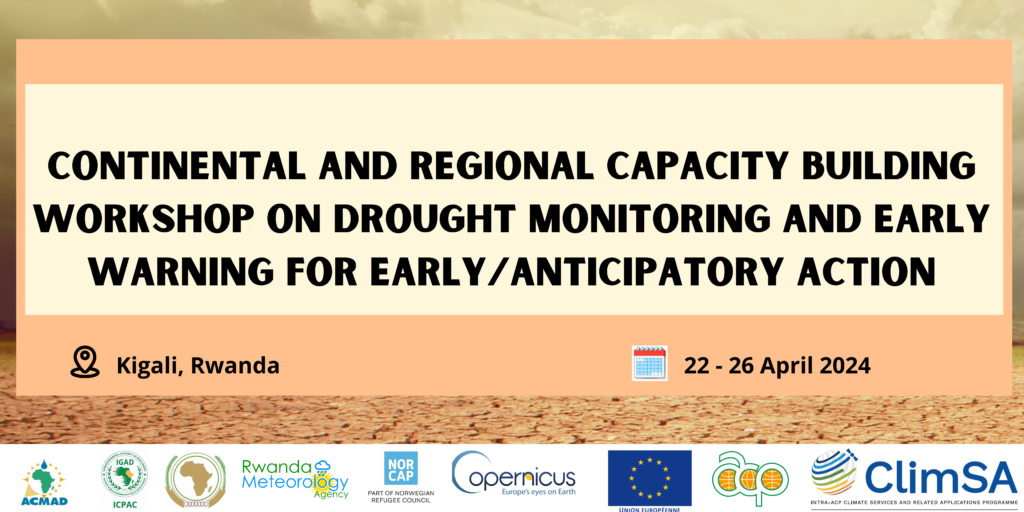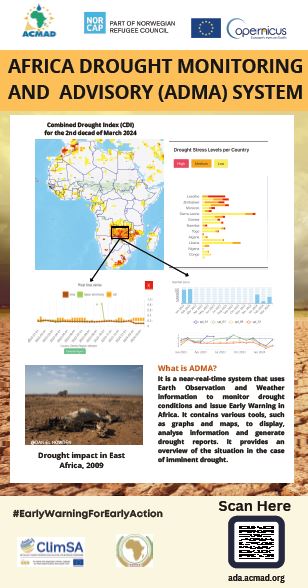Continental and Regional Capacity Building Workshop on Drought Monitoring and Early Warning for Early/Anticipatory Action
DATE
22 – 26 April, 2024
Venue: Kigali, Rwanda

About Workshop
The African Center of Meteorological Applications for Development (ACMAD) and the IGAD Climate Prediction and Applications Centre (ICPAC) in collaboration with the Joint Research Centre (JRC – EU) are organizing a combined regional and continental capacity building workshops for all the RECs with an aim of strengthening drought monitoring and early warning.
The workshop seeks to bring together technical practitioners from various national institutions mandated and involved in national and regional drought monitoring and management.
The ACMAD and ICPAC have developed African Drought Monitoring and Advisory System (ADMA) and the East Africa Drought Watch (EADW) respectively monitor drought and provide warnings for the member states with the support of the Joint Research Centre of the European Commission.
Launched in 2021, the EADW automatically and routinely monitors drought conditions using a combined bio-physical drought indicator across 11 eastern African countries namely: Burundi, Djibouti, Ethiopia, Eritrea, Kenya, Rwanda, Somalia, South Sudan, Sudan Tanzania, and Uganda.
The ADMA was launched on 2023 and monitors drought for the whole continent. In addition to supporting trans-border drought monitoring and management, the EADW and ADMA are meant to complement existing national drought systems while filling in the gaps for countries with no systems.
Objectives:
The objective of the capacity building workshop is to:
a) Establish a collective comprehension of drought phenomena and methodologies for
monitoring them, encompassing data, sources, and interpretation.
b) Strengthen the capabilities of regional and national institutions to generate and distribute
drought early warning information and monitor drought using ADMA and EADW.
c) Assess continental, regional, and national user needs to support the improvement of the two
systems
AGENDA
Time | Activity | Responsible | Facilitator |
8:30 – 9:00 | Registration | ACMAD/ICPAC | |
9:00 – 9:30 | Opening Remarks & Introductions – Rwanda Met. – ICPAC – ACMAD – Gov. Rep. Rwanda | Rwanda Met. | Rwanda Met. |
9:30 – 9:45 | Overview of the Project – Objectives of the workshop – Project Phase I & II | ACMAD/ICPAC | Rwanda Met. |
09:45 – 10:15 | – Overview of JRC work on drought – Global Drought Observatory[ is global drought status relevant to the region?] | Joint Research | Rwanda Met. |
10:15 – 10:45 | Tea break & Group Photo | ||
10:45 – 11:30 | Continental Drought EWS | ACMAD | ACMAD |
11:30 – 12:00 | Regional EWS | ICPAC | ACMAD |
12:00 – 13:00 | National Drought Monitoring & Early Warning Systems (or processes) [Presentation from national institutions] – Highlight existing systems/processes – Highlight challenges/opportunities – Socio-economic data/indicator | Rwanda Met. Kenya | ACMAD |
13:00 – 14:00 | Lunch break | ||
14:00 – 15:30 | Introduction to the African Drought Monitoring – Accessing the ADMA; ADMA interface;mapviewer; navigating through time; accessing | ACMAD | ICPAC |
15:30 – 16:30 | Group Practical session: Understanding Combined Drought Indicator and underlying | All | ACMAD / JRC |
16:30 – 17:00 | Health/Coffee Break |
Time | Activity | Responsible | Facilitator |
8:30 – 9:00 | National Drought Monitoring & Early Warning Systems (or processes) [presentation from national institutions – Highlight existing systems/processes –Highlight challenges/opportunities – Socio-economic data/indicator [10 mins per presentation] | Zambia Madagascar | ACMAD |
9:00 – 10:00 | Group Presentation and discussions | All | ACMAD/JRC |
10:00 – 10:30 | African Drought Monitoring and Advisory System – Understanding drought extent and evolution [Interactive session & practical discussion] | ACMAD / JRC | ICPAC |
10:30 – 11:00 | Health/Coffee Break | ||
11:00 – 12:00 | Plenary Session | RECs/National | ACMAD |
12:00 – 13:00 | ADMA – Analysis and Reporting functionality continued | ACMAD | ICPAC |
13:00 – 14:00 | Lunch break | ||
14:00 – 15:30 | [Practical exercise – objective: situational analysis to support intervention decision] – Group presentation [10 mins per group] – Interactive session [map key information (indicators) necessary for intervention decision and action] | All | ICPAC/ACMAD |
15:30 – 16:30 | Plenary Session | All | JRC / ACMAD |
15:30 – 16:30 | Group Practical session: Understanding Combined Drought Indicator and underlying | All | ACMAD / JRC |
16:30 – 17:00 | Health/Coffee Break |
Time | Activity | Responsible | Facilitator |
8:30 – 9:00 | National Drought Monitoring & Early Warning Systems (or processes) [presentation from national institutions – Highlight existing systems/processes – Highlight challenges/opportunities – Socio-economic data/indicator [10 mins per presentation] | Zambia Madagascar | ACMAD |
9:00 – 10:00 | Introduction to the East African Drought Watch | ICPAC | ACMAD |
10:00 – 10:30 | Health/Coffee Break | ||
10:30 – 11:30 | Group Practical session: Understanding Combined Drought Indicators and Underlying | All | ICPAC / JRC |
11:30 – 13:00 | East Africa Drought Watch | ICPAC | ACMAD |
13:00 – 14:00 | Lunch break | ||
14:00 – 15:00 | EADW – Analysis and Reporting functionality continued | ICPAC | ACMAD |
15:00 – 16:30 | EADW – Analysis and Reporting functionality continued – Group presentation [10 mins per group] | All | ICPAC / JRC |
15:30 – 16:30 | Group Practical session: Understanding Combined Drought Indicator and underlying | All | ACMAD / JRC |
16:30 – 17:00 | Health/Coffee Break |
Time | Activity | Responsible | Facilitator |
8:30 – 9:00 | Recap | AUC | AUC |
9:00 – 10:00 | EADW – Creating drought EW bulletin | ICPAC / JRC | ACMAD |
10:00 – 10:30 | Health/Coffee Break | ||
11:00 – 13:00 | EADW – Creating drought EW bulletin | All | ICPAC / JRC |
13:00 – 14:00 | Lunch break | ||
14:00 – 15:00 | Plenary Session | All | ACMAD |
15:00 – 16:30 | Plenary session – What was done during the recent drought, and what was effective | All | ICPAC / JRC |
16:30 – 17:00 | Health/Coffee Break |
Time | Activity | Responsible | Facilitator |
9:00 – 9:30 | Recap | ICPAC | |
9:30 – 10:30 | User needs assessment | All | ACMAD / ICPAC/ |
10:00 – 10:30 | Health/Tea/Coffee Break | ||
11:00 – 11:30 | User needs assessment | All | ACMAD / ICPAC / JRC |
11:30 – 13:00 | Recommendation | All | ACMAD / ICPAC / JRC |
13:00 – 14:00 | Lunch break | ||
14:00 – 15:00 | Closing ceremony | Host institution | Host institution |
15:00 – 16:00 | Networking and Tea/Coffee break | All | All |
Contact
For more inquiries, please contact this following link: contact@acmad.org

